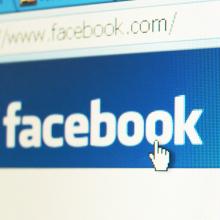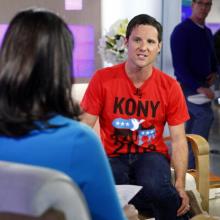social media
The tragedy of the Steubenville rape case has provided a moral challenge to our nation. We are caught up in a highly emotional cycle of blame as we debate who the real victim is in this case. I find myself asking two questions: Why is our nation obsessed with the story and what does this story mean for us as individuals and as a culture?
My Family
I’ve always wanted a daughter. The problem is that adult Ericksen dudes tend to produce baby Ericksen dudes. My dad has 4 siblings — all brothers. I have mostly male cousins. So, when my wife and I started having children … yep … two dudes.
My Church Family
I’ve been a youth pastor for about six years, and for a long time I thought the closest I’d ever get to having a daughter was to pseudo-adopt the girls in my youth group. Actually, they first pseudo-adopted me by claiming me as their “Father” on Facebook. (Hey, it’s on Facebook, so my pseudo-fatherhood status is legit.) As something of father figure for these teenage girls, each youth group session I discussed with young women and men how the Christian faith is leading us into patterns of love and non-violence. Frequently after our sessions, one of my pseudo-daughters will tell me she’s dating a boy. So, of course, after teaching them about non-violence, I say to each of them with a straight face:
If he ever touches you, I will personally kick his ass.
It’s easy to look at the now-infamous Steubenville case and see a Penn State writ small — a story of rape in the social-media age. What’s harder to see in Steubenville is ourselves. Yet the moral confusion of witnesses who prevented drunk friends from driving while permitting the assault on a teenage girl too drunk to resist or consent to sex cannot be understood apart from our widespread mockery of sexual restraint.
Self-control gets no respect in the bedroom. Hold back the passions deemed healthy and good? At best you’re quaint and immature, at worst repressed and puritanical. And don’t you dare suggest that possibly a little restraint might benefit those just becoming aware of their newly adult bodies. How dare anyone presume to limit another’s freedom, especially their sexual freedom?
Except in pockets of religious devotion, that’s the prevailing cultural sentiment toward sex and self-control in this country. And we don’t just defend our individual bodily freedom against almost any call to limits; we don’t even seem to believe you can control such desires.
So of course the 40-year-old virgin happened accidentally. It’s virtually a movie cliché that any deliberately chaste character will soon get his or her sexual comeuppance, as seduction or human nature eventually trumps principle.
And therein lies the problem.
A VARIETY OF EVANGELICAL peacemaking efforts have sprung up in recent years, from the Two Futures Project, which seeks a world without nuclear weapons, to the World Evangelical Alliance’s Peace and Reconciliation Initiative, which seeks to redress the fact that “in our zeal for evangelism, we have often overlooked the biblical mandate to pursue peace.”
This fall, evangelicals from a range of viewpoints gathered at Georgetown University in Washington, D.C., exploring what a distinctive evangelical contribution to peacemaking might look like. The essays below, unless otherwise noted, are taken from the first Evangelicals for Peace conference, a “summit on Christian moral responsibility in the 21st century.” Organizers hope to publish a book with the entire collection of talks. —The Editors
-----
‘All the Easy Jobs Have Been Done’
Standing on a rich tradition of peace and transformation
by Geoff Tunnicliffe
WHY IS PEACEMAKING an important topic for evangelicals? As a global community of 600 million Christians, our churches are confronted daily with the impact of illegal weapons. Our hospitals treat the victims of violence. Our church leaders counsel the traumatized. All forms of conflict negatively impact our development programs. Our aid agencies seek to care for and rehabilitate child soldiers. Our inner-city communities are confronted with the outcomes of gang warfare.
For all of us who say we are followers of Jesus, as we observe or experience the brokenness of our world, it should break our hearts. If we feel the pain so deeply, I can’t imagine what our loving God feels. The One who is called the Prince of Peace. The One who laid down his life, so that we could be reconciled to God and each other.
The World Evangelical Alliance’s engagement in peacemaking stands on the rich traditions of evangelicals who have devoted themselves to being instruments of social change and transformation. We want to say loudly that we evangelicals want to be on the forefront of peacebuilding. All the easy jobs have been done. It’s just the tough ones that are left. It requires clear vision to face these challenges.
We as evangelicals are committed to working together with those in and outside our community for the good of all. May God empower us through the work of his Spirit to be his ambassadors of peace and reconciliation.
DOES THE RIGHT to free speech include the right to yell “Fire!” in a crowded social network?
That’s one of the questions raised by the violent overreaction by some Muslims to the 14-minute YouTube video clip, Innocence of Muslims.
Of course, my question paraphrases the words of Supreme Court Justice Oliver Wendell Holmes in deciding that speech likely to cause immediate violence could be restricted. However, over the course of the 20th century, the American standard for limiting potentially harmful speech has gotten a lot tougher. For the past 50 years or so, it’s been settled law in the U.S. that the First Amendment protects speech that is, like Innocence of Muslims, false, hateful, malevolent, and even very badly written, acted, and produced. But the Internet Age is bringing new challenges to America’s free-speech fundamentalism.
Tolerance of blasphemous, racist, and defamatory material is commonplace to most Americans. We take it as one of our God-given rights. But, in fact, this is a real example of American exceptionalism. No other liberal democracy in the world protects speech that is plainly intended to wound and insult members of a specific racial or religious group. “Hate speech” prohibitions are the rule throughout the Western world.
Meet the social media “nones.” A new survey finds that Americans, while mostly religious, generally do not use social media to supplement worship and mostly keep their faith private online.
The Public Religion Research Institute survey found about one in 20 Americans followed a religious leader on Twitter or Facebook. A similar number belonged to a religious or spiritual Facebook group.
The results seem to defy the familiar story of prominent religious leaders using social media to build a following – and a brand.
“We were surprised when this turned up really low levels of people engaging religion and faith online,” said PRRI research director Daniel Cox.
Christ Fellowship exemplifies most of the latest ways churches dramatically extend their reach of church beyond any one time or local address. Such congregations signal "a willingness to meet new challenges," said Scott Thumma, of the Hartford Institute for Religion Research. He's the author of a study by Faith Communities Today (FACT) of how churches, synagogues and mosques use the Internet and other technology.
FACT's national survey of 11,077 of the nation's 335,000 congregations, released in March, found seven in 10 U.S. congregations had websites, and four in 10 had Facebook pages by 2010, Thumma says.
The recent cover article in The Atlantic called “Is Facebook Making Us Lonely?” (Stephen Marche) is worth sharing. It’s about a growing trend of social isolation and loneliness in our culture, despite innumerable social media connections we use to counteract that problem.
As good as the article itself is, the title is misleading, I think. Though I agree with each of the points made about the epidemic levels of loneliness we’re experiencing, I would argue that sites like Facebook, Pinterest and Twitter are byproducts of this isolation, rather than the cause of the loneliness.
When they become problematic is when we rely on them to be a surrogate for real, face-to-face relationship. I consider that akin to sitting on your couch and taking stimulants to lose weight, rather than changing your exercise and diet habits. Sure, you may get some results, but at what greater cost?
After returning to the U.S., they produced a film titled Invisible Children and then set up a non-profit organization by the same name as the vehicle through which they could use the film to raise awareness of the child soldiers.
I believe that the centrality of film and social media to Invisible Children’s organizing strategy places it at the forefront of new innovative forms of global activism that have to capacity to create a degree of intimacy between people living on opposite sides of the globe that could not have been possible in the past. Social media as an organizing tool also opens up the possibility of creating extensive webs of interactions between activists across the globe. It allows story-telling to be a global enterprise.
The use of social media also has the power to unleash much greater local initiative and innovation by enabling direct communication between activists in different geographic locations across the global, without information first needing to flow up through traditional hierarchical organizational structures to a national staff that perhaps sends it back down again to activists in other local areas.
Consciously or not, when we recognize the need to step away from social media, it is because we are questioning who is in control.
If our default is to ask life’s big questions on Twitter before we offer them in prayer, then someone other than God is in control. If we "Like" what someone is doing of Facebook before we recognize everything God is doing in our lives, maybe we need a social media time-out.
Lent is the right time to realign ourselves with the fact that God should be in control in our lives.






